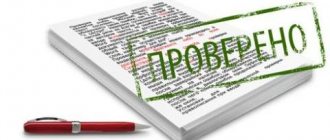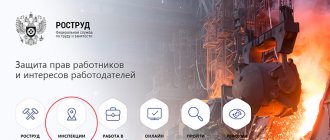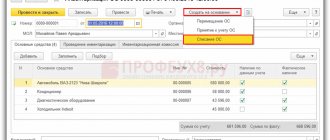» Checks and fines
In order to understand what Rospotrebnadzor checks, it is necessary to clearly understand what functions are assigned to it, as well as the rights and various responsibilities when conducting their inspections. Due to the certain specifics of this body, inspections of this institution will concern the documentation that must be in the enterprise or institution, as well as the quality of products that are produced or sold, and provided by src=»https://ipexperts.ru/wp-content/ uploads/2016/05/rospotrebnadzor_4_18191035-500×375.jpg" class="aligncenter" width="500″ height="375″[/img]
- 2 Types of checks
- 3 Deadlines for conducting inspections, as well as the rights and obligations of Rospotrebnadzor
When Rospotrebnadzor conducts an unscheduled inspection
The grounds for an unscheduled inspection by Rospotrebnadzor are given in clause 26 of the Administrative Regulations, approved. by order of Rospotrebnadzor dated July 16, 2012 No. 764. The inspection is carried out if:
- a complaint has been received from a citizen, organization or government body;
- the period allotted for eliminating violations identified during a previous inspection has expired;
- a demand was received from the prosecutor's office.
The reason why the inspectors came with the inspection must be recorded in the order of Rospotrebnadzor on its appointment.
If you receive an order to eliminate identified violations:
- you have 15 days from the date of receipt of the inspection report to submit to Rospotrebnadzor in writing your objections to the issued order in general or its individual provisions. You can also attach documents that will confirm the validity of the objections.
- When the deadline for fulfilling the issued order expires, the Rospotrebnadzor official will organize an unscheduled inspection. The inspection is carried out no later than 1 month from the end of the period during which the person who received the order should have notified the Rospotrebnadzor official who issued the order about its implementation.
- If during an unscheduled inspection it turns out that you did not comply with the order within the appointed time, an official of Rospotrebnadzor initiates proceedings for an administrative offense and issues a new order to eliminate violations (which you did not eliminate within the appointed time) with new deadlines for their elimination.
Procedure for conducting an unscheduled inspection
Rospotrebnadzor conducts audits outside the established schedule in the following sequence:
- A notice of the upcoming inspection is sent to the organization being inspected. Please note that notice will not be provided in the situations we describe below.
- On the appointed day, a request is sent to the organization to provide certain documents (during a documentary check) or inspectors arrive (during an on-site visit).
- Inspectors conduct an inspection, following which a report is drawn up. It records the audit results, identified violations (if any) and deadlines for their elimination. If there are violations, the inspector:
- issues a warning to the official responsible for that part of the enterprise’s activities in which inconsistencies were found;
- imposes a fine on the organization; or
- suspends the activities of the organization for a certain period.
ConsultantPlus has many ready-made solutions, including the article “Procedure for conducting inspections by Rospotrebnadzor.” If you don't have access to the system yet, sign up for a free trial online. You can also get the current K+ price list.
What kind of violations happen?
Inspectors are required to draw up an inspection report. If violations are detected, they may issue an order to eliminate the violations or apply administrative measures.
If the company received the order, inspectors found minor violations. However, for failure to comply with the order, company officials may be fined up to 2,000 rubles, and a legal entity faces a fine of up to 20,000 rubles under Article 19.5 of the Code of Administrative Offenses of the Russian Federation.
Important: the order must be correct and enforceable. The wording must be clear and unambiguous. Otherwise, the document can be appealed.
Administrative measures, up to and including a temporary ban on activities, are applied to those companies whose activities pose a threat to the life and health of citizens, harm to animals, plants, and the environment.
If inspectors find signs of crimes related to violations of sanitary legislation or legislation on the protection of consumer rights, Rospotrebnadzor will forward the materials to law enforcement agencies to initiate criminal proceedings.
Form of verification: documentary, on-site
Unscheduled inspections of Rospotrebnadzor in 2021 are divided into:
- to documentary;
- away.
The documentary check is carried out on the territory of Rospotrebnadzor (Part 2 of Article 11 of the Federal Law “On the Protection of Rights...” dated December 26, 2008 No. 294-FZ). The inspected organization must provide copies of the requested documents, certified by the signature of the head and seal (if any). You can present electronic images of documents, but in this case they will have to be certified with an enhanced qualified electronic signature of the manager (Part 6, Article 11 of Federal Law No. 294). 10 working days are allotted for the transfer of documents (Part 5, Article 11 of Federal Law No. 294).
An on-site inspection is carried out on the territory of the organization being inspected (Part 2 of Article 12 of Federal Law No. 294). The need to carry it out arises if it is not possible to:
- check how true the data specified in the documents submitted by the organization is;
- establish compliance of processes occurring within the company with legal requirements.
Moratorium on inspections of enterprises
The resolution mentioned above was adopted to reduce the administrative burden on small businesses and rapid economic growth. However, the moratorium will not apply to all business entities and not always.
Completely exempt from scheduled inspections:
- non-profit associations with an average of no more than 200 employees. Exceptions are non-profit organizations recognized as foreign agents and political parties;
- LLCs and individual entrepreneurs, which belong to small and medium-sized businesses.
Reasons for an unscheduled inspection of such enterprises may be:
- personal inspections - if monitoring of business activities is carried out within the framework of an order from the government or the President of the Russian Federation regarding a specific legal entity or individual;
- activities that are carried out to monitor compliance with the requirements of the previous inspection. An entrepreneur or LLC must demonstrate that measures have been taken to prevent a threat to the health and life of citizens;
- facts of threat or harm to the life and health of citizens, as well as if there is a danger of an emergency. The inspection must be agreed upon with the prosecutor's office;
- identifying false information specified in licensing documents, as well as checking the enterprise before reinstating the license;
- requirement of the prosecutor's office when the basis for the inspection is an appeal from citizens or case materials;
- identification of a gross violation of the law by an entrepreneur or LLC;
- forced suspension of business activities.
On July 1, the previously adopted law No. 248 of July 31, 2020 comes into force. Now inspectors will be able to conduct inspection visits rather than on-site inspections, and the duration of the inspection will be a maximum of 10 days. In addition, control activities can be carried out remotely - online via video link.
An audit can be initiated not only by tax authorities, but also by other departments: Social Insurance Fund, Pension Fund of the Russian Federation, Federal Migration Service, Rospotrebnadzor, fire service, labor inspectorate, etc.
Powers of Rospotrebnadzor
During the audit, Rospotrebnadzor is obliged to comply with the restrictions established by Art. 15 Federal Law No. 294. This means that the inspector:
- checks only those sources of information that are relevant to the subject of verification;
- selects samples for research in quantities that comply with the standards, subject to drawing up sampling protocols;
- studies documentation containing secrets protected by law (commercial, official, etc.);
- Conducts inspections in compliance with established deadlines.
Documents provided to Rospotrebnadzor inspectors
Initially the following documents are checked:
- articles of association;
- data on assignment of TIN;
- licenses for a certain type of activity;
- lease agreements or property rights relating to territories and premises.
In the field of sanitary and hygienic control the following are subject to inspection:
- contracts for disinfestation, disinfection and deratization;
- contractual documents for waste removal;
- results of environmental quality analyses;
- results of studies of sanitary indicators of waste storage sites;
- logs of the sanitary condition of the facility;
- industrial sanitary control program;
- availability of lists of contingents subject to mandatory medical examination and sanitary and hygienic passports of women
Regarding labor relations, inspectors should be provided with:
- medical and work records;
- documents on education and qualifications of employees;
- contracts concluded by the organization with employees.
Does Rospotrebnadzor notify about an unscheduled inspection?
The answer to the question of whether Rospotrebnadzor should warn about an unscheduled inspection depends on its focus.
Preliminary notification is not necessary if the following is checked:
- information about possible harm to humans, nature or objects of cultural heritage (Part 16, Article 10 of Federal Law No. 294);
- activities of enterprises related to products, including public catering (Part 2 of Article 13 of the Law “On Quality...” dated January 2, 2000 No. 29-FZ).
In other circumstances, Rospotrebnadzor is obliged to notify about the inspection no later than 24 hours before the inspectors arrive (Part 16, Article 10 of Federal Law No. 294).
What to do if you find yourself in terms of inspections, despite the moratorium on inspections in 2021
A new system of inspections of individual entrepreneurs and LLCs is currently being actively formed. At the same time, the number of both planned and unscheduled events is reduced, and information about planned visits is publicly available.
For example, through the online service of the Prosecutor General’s Office “Unified Register of Inspections” you can find information about planned inspections for 2021. The Federal Tax Service publishes a document with data on planned control activities on its website - anyone can download the document and search for their enterprise by TIN.
If an LLC or individual entrepreneur finds itself on the list of those being inspected in 2021, but is subject to a moratorium, then you should not simply ignore the information received. To exclude yourself from the register of those being audited, you need to:
- submit an application in Form No. 1268 “On approval of the rules for filing and considering an application to exclude an inspection of a legal entity and individual entrepreneur from the annual plan of legal inspections”;
- Attach supporting documentation to the application (certificate of number of employees, a copy of the income and expenses ledger, etc.).
The regulatory authority will have 10 days to consider the received application. After which the information about the enterprise will be excluded from the register or the applicant will receive a reasoned refusal.
You can write a statement not only before the inspection begins, but also if it has already been initiated by department employees. In this case, all activities are suspended while the application is being considered.
How often can Rospotrebnadzor come with an inspection?
The number of audits is not limited by law. This means that inspectors can come at least every month. The main thing is that the duration of each such inspection does not exceed 20 working days (Part 1 of Article 13 of Federal Law No. 294).
Reduced deadlines for conducting inspections for enterprises with small turnover and numbers (50 hours for a small enterprise and 15 hours for a micro-enterprise), established by Part 2 of Art. 13 Federal Law No. 294, do not apply during unscheduled events. They are carried out in the usual manner.
Documents to be verified
Many entrepreneurs are interested in the question, what documents does Rospotrebnadzor check? By law, an entrepreneur is required to provide for verification:
- Statute, charter;
- Completed health certificates;
- Documentation of control of sanitary standards;
- Licenses to provide services;
- Notice boards;
- Books of complaints and statements;
- Menu or price list;
- Documents on the basis of which the premises were rented or purchased;
- Contracts with third parties (for waste removal, disinfection);
- Sanitary audit logs;
- Logbook for registration of disinfectants.
Results
Rospotrebnadzor conducts unscheduled inspections outside the schedule if an organization has received a complaint or demand from the prosecutor's office.
The inspection can be documentary (inspectors request the necessary information and study it independently) or on-site (inspectors come to the organization being inspected and work on site). You can find more complete information on the topic in ConsultantPlus. Free trial access to the system for 2 days.
When the inspectors arrive
Rospotrebnadzor conducts scheduled and unscheduled inspections of companies. Supervision officers carry out planned activities on the basis of a plan that is drawn up for each calendar year. Unscheduled inspections are usually carried out based on consumer requests.
Law No. 294-FZ identifies two categories of citizen complaints: violation of consumer rights and others. When it comes to violation of rights, the consumer must first demand their restoration from the infringing company. Only if the consumer’s requirements are ignored or not satisfied can you contact Rospotrebnadzor.
If the complaint is not related to consumer rights, you can immediately report to Rospotrebnadzor:
- about the fact or threat of harm to the health of citizens (violation of sanitary requirements, violation of legislation on technical regulation, etc.);
- about the fact of sale of goods that do not meet safety requirements.
If a citizen makes a complaint to a company, it is better to try to resolve the conflict peacefully. Or prepare for an inspection by Rospotrebnadzor.
How to “fight off” an inspection: TOP 10
Gross violations that allow the results of the inspection to be invalidated are listed in Article 20 of Law No. 294-FZ. The provisions of the Law are supported by court decisions.
- Notice deadlines were violated. For example, when the company is notified not three, but one working day before the inspection (resolution of the Volga-Vyatka District AS dated November 21, 2021 No. F01-4865/2016, Volga-Vyatka District Federal Antimonopoly Service dated October 11, 2010 in case No. A29-1421/2010) or immediately before the inspection (decision of the Moscow Arbitration Court dated March 14, 2014 in case No. A40-7511/14).
- The company was not notified of the inspection (Determination of the Supreme Court of the Russian Federation dated October 26, 2021 No. 305-KG16-21421, resolutions of the Supreme Court of the Russian Federation dated February 26, 2021 No. 41-AD18-6 and dated February 1, 2021 No. 72-AD16- 4, AS of the Moscow District dated November 30, 2021 No. F05-16661/2017). Delivery of a notice to an unauthorized person will also be a gross violation (Resolution of the Federal Antimonopoly Service of the Far Eastern District dated May 13, 2014 No. F03-1776/2014).
- Non-accredited (non-certified) expert organizations (experts) were involved in the inspection. For example, when an organization is accredited to study certain product indicators, but in fact others are studied (Resolution of the Tenth Arbitration Court of Appeal dated October 27, 2021 No. 10AP-13749/2017).
- The inspection has not been coordinated (when necessary) with the prosecutor's office (Determination of the Supreme Court of the Russian Federation of July 17, 2021 No. 309-KG17-8104, resolution of the North-Western District Court of July 4, 2021 No. F07-5323/2017 in case No. A42- 1131/2016, Saratov Regional Court dated June 6, 2021 No. 4A-427/2017).
- The inspection was carried out based on an anonymous request from a citizen (resolution of the Administrative District of the East Siberian District dated February 9, 2021 No. F02-7516/2015).
- The inspection was carried out without a corresponding order (instruction). Some Rospotrebnadzor specialists believe that a citizen’s application is sufficient for verification activities. However, the courts indicate that a decision (order) to conduct an inspection must be drawn up mandatory (resolutions of the Supreme Court of the Russian Federation dated April 9, 2015 in case No. 301-AD15-1997, AS of the Volga-Vyatka District dated June 29, 2015 No. F01-2342/ 2015, AS of the Central District of October 2, 2014 in case No. A08-5222/2013). Also, the results of the inspection will be invalid if the order (order) was signed by an unauthorized person, for example. O. head (Resolution of the Supreme Court of the Russian Federation of October 2, 2021 No. 35-AD17-2). According to the rules, such documents can be signed by the head (or deputy head) of the territorial body of Rospotrebnadzor (Part 12, Article 8 of Law No. 294-FZ).
- An inspection in the manner prescribed by Law No. 294-FZ was not carried out at all, but the company was issued an order to eliminate violations (Determination of the Armed Forces of the Russian Federation dated August 7, 2015 No. 279-PEK15, Resolution of the AS of the Ural District dated July 4, 2021 No. F09- 7063/16). Typically, such “checks” are carried out in a “simplified” manner based on the general norms of the Code of Administrative Offenses of the Russian Federation. But the issuance of an order is not provided for by the Code of Administrative Offenses of the Russian Federation, but by Law No. 294-FZ. If so, then all activities must be carried out within the framework of this law.
- The company was not given (not sent) an inspection report (Resolution of the Arbitration Court of the Volga-Vyatka District dated April 25, 2021 No. F01-1335/2016 in case No. A31-7367/2015).
- The expert (expert organization) has a civil or labor relationship with the company being inspected or is affiliated with it (Resolution of the Federal Antimonopoly Service of the Volga-Vyatka District of February 21, 2013 in case No. A38-1549/2012). For example, if an expert organization provides services to the company being inspected for the destruction of rodents in a store (decision of the Kurgan Regional Court of May 27, 2021 in case No. A34-1556/2016).
- The inspection period has been exceeded. For example, when an inspection lasts 23 working days instead of 20 (Resolution of the Federal Antimonopoly Service of the Far Eastern District dated November 17, 2010 No. F03-7740/2010), despite the fact that the inspection period was not officially extended or the extension is not justified (Resolution of the Federal Antimonopoly Service of the Moscow District dated September 24, 2013 in case No. A40-120263/12-17-1139).
Important
Inspectors do not have the right to take away original documents or request data or products not related to the subject of the inspection. The inspector does not have the right to issue orders to carry out any control measures at the expense of the person being inspected. Any inspection results are considered a secret protected by law, and inspectors have no right to disclose it.







